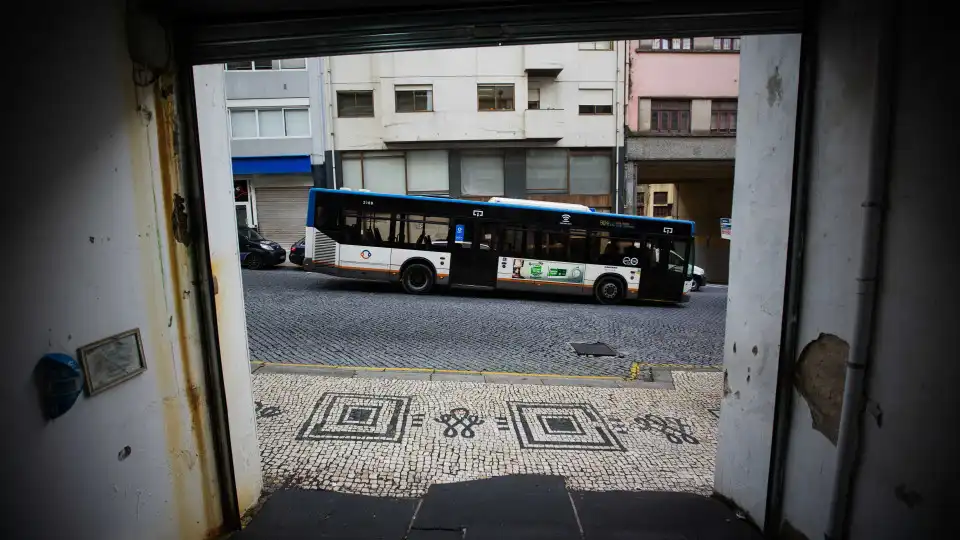António, Rosa and Lino went from fear to work achievements at STCP
António, Rosa and Lino, employees of the Porto Public Transport Service (STCP), lived through the fear and hardship of the Estado Novo, without political involvement, and ended up benefiting from labor conquests thanks to the organized struggles after the 25th of April.

© Global Imagens

País 25 Abril
Having started at the old Serviço (nowadays Sociedade de Transportes Coletivos do Porto) at the age of 14, "as an apprentice car painter", António Nogueira, now 68, remembers well what the working day was like in the Carcereira workshops, now dismantled and transformed into offices with the modern name of Porto Office Park (POP).
"Life was hard. When I started there, I would start at 8:00 and finish at 18:00. At the time, we worked nine hours a day. And on Saturdays until midday. That was 48 hours a week", he recalls.
Stating today that he has no party and that before the 25th of April he left the front line of the struggle to "those who belonged to the Communist Party and were organised", the former workshop worker still dared to go on strike in the middle of the New State and faced the consequences.
"The police surrounded us, they had a van there, there was also an individual from the PIDE there, they set up a table in the middle of the workshop" to ask who was going to work.
According to António Nogueira, "the first two or three who said they were not going to work immediately got into the van", and after a few days, even those who did not get in were all "called to the PIDE", on Rua do Heroísmo.
"I was there one afternoon, me and my colleagues, we didn't all go on the same day, but we had to go there", remembering that "it was a bit intimidating" and there was "a very heavy atmosphere", much worse for those who stayed in the cells.
Lino de Carvalho, 80, a former administrative worker who became head of service, knew well that "people, even if they had never experienced it first-hand, were aware of the 'be careful what you say'".
"There was this sense of... I wouldn't say fear, but of caution", he recalls.
His wife, Rosa Couto, 79, corrects him: "It was fear, really. It wasn't just an awareness that we couldn't take risks."
"I never cared about politics, it was never something that interested me. But those who did suffered the consequences. We were aware of that", acknowledges Rosa, also a former administrative worker and head of Human Resources.
At the STCP, depending on their function, some workers suffered more than others. Rosa's colleagues who were arrested "were all workshop workers", workers who "had no facilities whatsoever" granted by the company or the regime.
For example, identified in their clothing with a "badge", they were entitled to a few transport places "at the front and back of the tram, on the side", but "if they were administrative workers, they were entitled to sit inside the vehicle", recalls Lino. "It was absurd".
Both in the workshops and in the offices, "the newspaper was distributed", according to Rosa, but this type of subversive activity was, obviously, carried out "in total secrecy", confirms her husband.
"Before the 25th of April, propaganda was already appearing there. Pamphlets. We had no idea where they came from, at the time. At least I, at the time, was young and didn't even think about it, but there already were", says António Nogueira.
But even for the three former employees of the Serviço who were never very involved in the struggle, fought mainly by communists within the company, the revolution brought improvements.
"What we are talking about here, besides all the political and party circumstances, ended up being a great transformation in terms of workers' rights", asserts Rosa.
For António Nogueira, who experienced the harshness of the workshops first-hand, "the greatest achievement was labour issues and workers' benefits".
"They paid very badly before the 25th of April. Then they started paying better, with negotiations. The strikes also helped to achieve a lot. It improved a lot", he recalls, noting the difference in "material conditions" and "safety issues", but above all "in terms of rights and benefits".
From the age of 17 "until he was 57 or so", Lino never went to a health centre because he had everything at the company.
"We had the medicines. We had everything. We had the dentist, we had a plan, the company had a paediatrics service, then we went to specialists outside, and we had the best specialists in Porto", recalls Rosa.
António Nogueira saw, immediately after the revolution, "a greater unity of the workers" to conquer these benefits, but "from the 1990s onwards, that unity began to be lost": "everyone was pulling in their own direction" and some benefits "are being lost because workers no longer have the power to demand as they did at the time".
"The workers lost their strength because someone took their strength away from them. Things don't happen like that from one moment to the next", he warns.
Even so, for Rosa Couto, "the fundamental is there and they cannot take it away".
Leia Também: 25 Abril: Seleção em contraciclo com clubes em plena revolução (Portuguese version)

Descarregue a nossa App gratuita.
Oitavo ano consecutivo Escolha do Consumidor para Imprensa Online e eleito o produto do ano 2024.
* Estudo da e Netsonda, nov. e dez. 2023 produtodoano- pt.com



